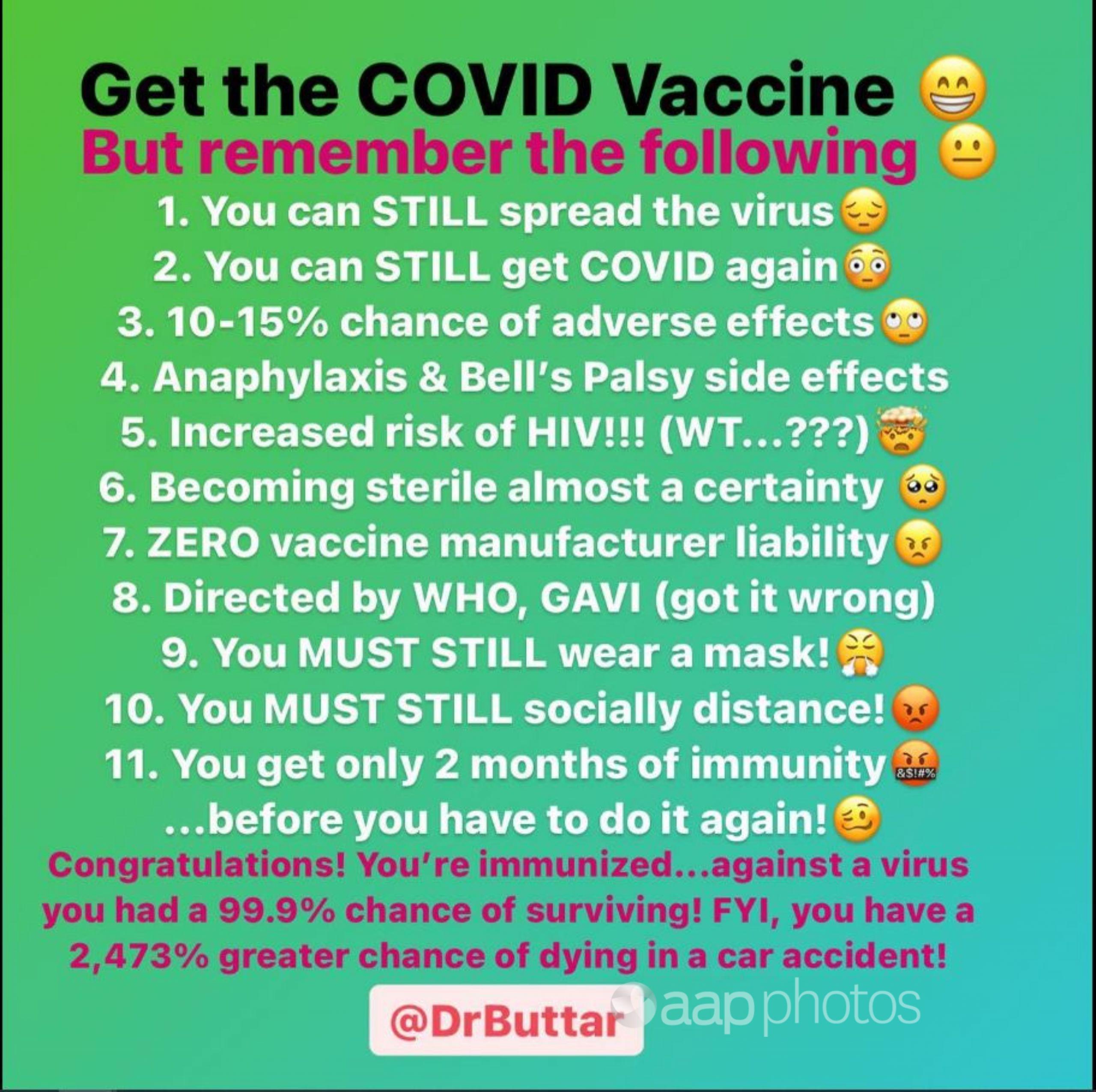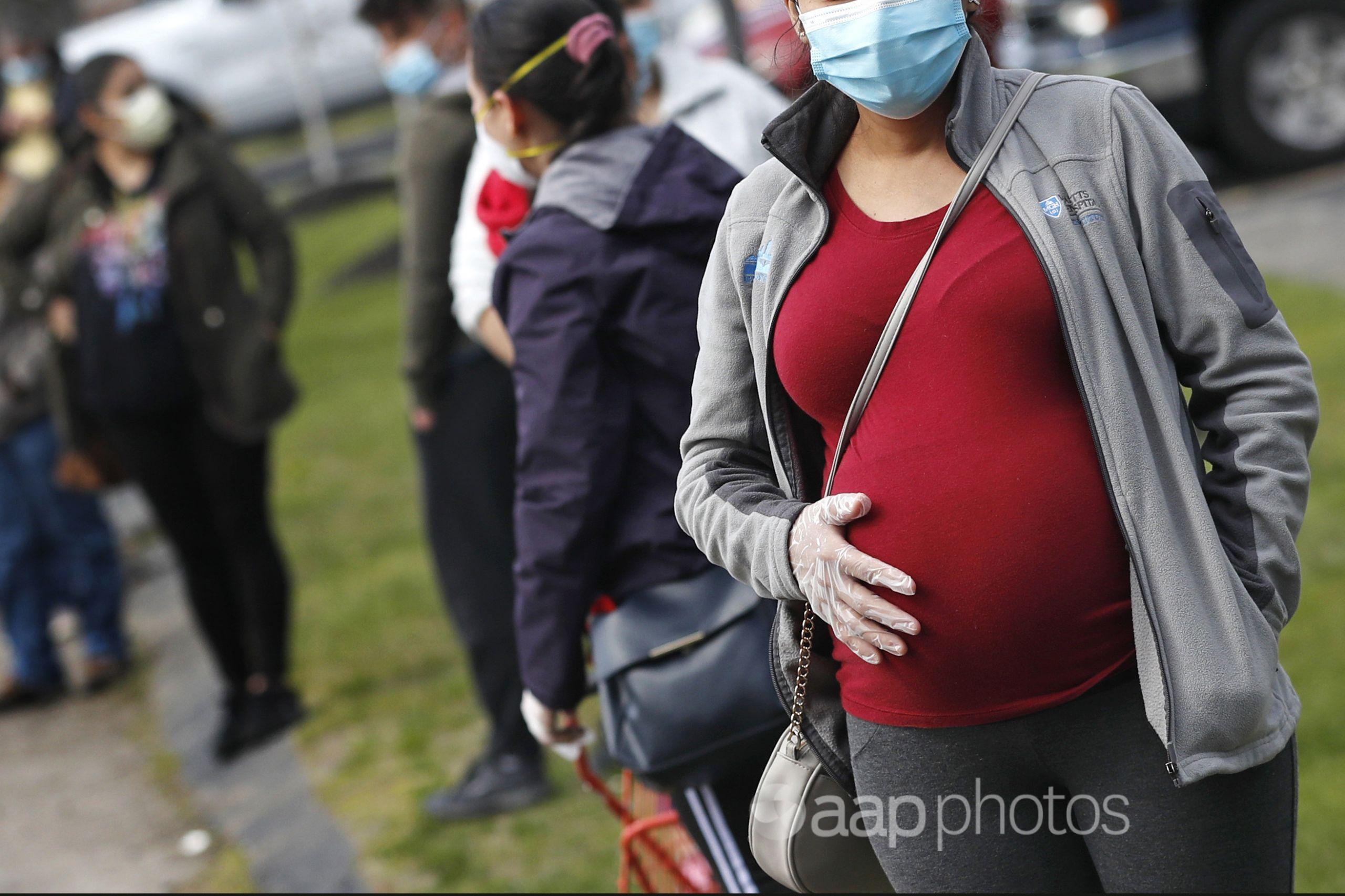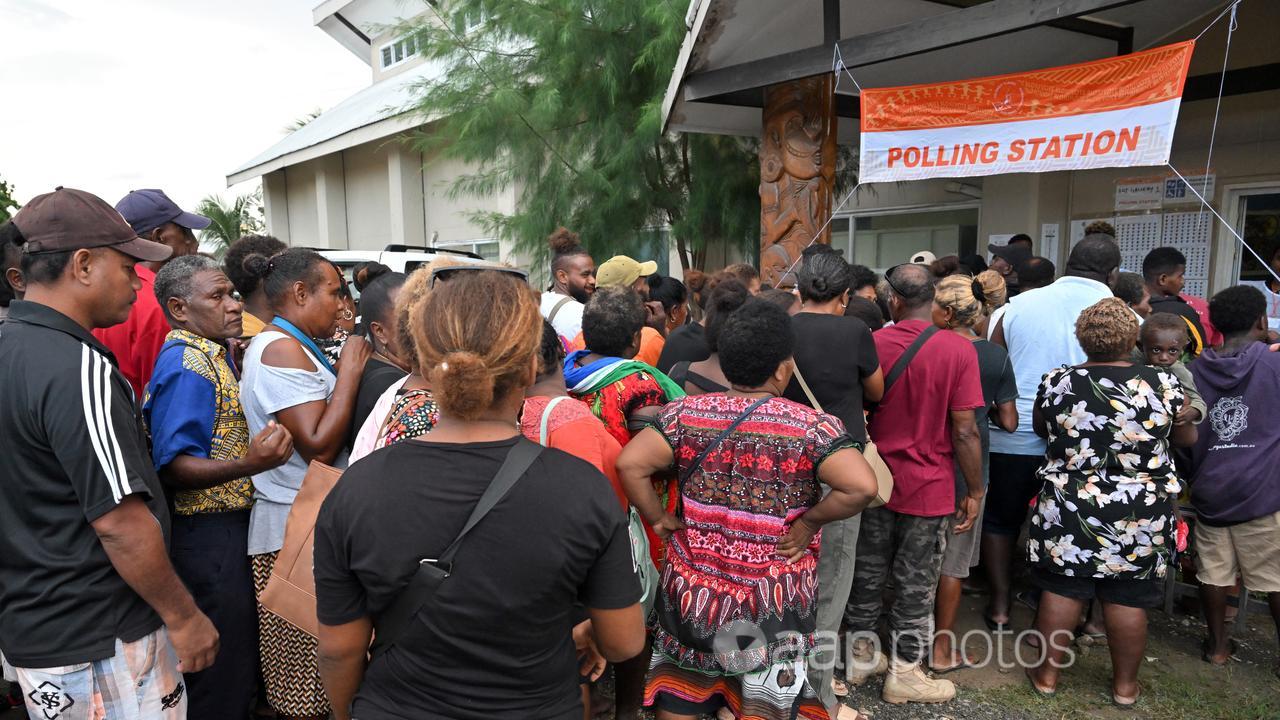The Statement
A Facebook meme shared by an Australian user claims that “becoming sterile is almost a certainty” for those who receive a COVID-19 vaccination.
“Get the COVID Vaccine but remember the following,” reads the January 23 post. It goes on to list 11 points, which includes a claim that vaccines “(have a) 10-15% chance of adverse effects and increase risk of HIV”.
The post finishes by saying, “Congratulations! You’re immunised…against a virus you had 99.9% chance of surviving.”
At the bottom of the post is an attribution to the Twitter handle for Rashid. A Buttar, a former army surgeon and promoter of conspiracy theories. He also posted the meme on Facebook, attracting more than 250 shares at the time of writing.

The Analysis
There is no evidence that COVID-19 vaccines approved for use in countries such as Australia or the United States will result in sterility, with a number of women involved in clinical trials conceiving after receiving the treatments.
In the United States, the first COVID-19 vaccine granted emergency use authorisation (EUA) by the US Food and Drug Administration (FDA) was the Pfizer/BioNTech candidate on December 11, 2020 with an EUA granted to the Moderna vaccine candidate on December 18.
Australia’s health regulator, the Therapeutic Goods Administration (TGA), gave provisional approval to Pfizer’s COVID-19 vaccine in January. It is due to be rolled out in February, while the AstraZeneca vaccine candidate continues to undergo review.
The claim that COVID-19 vaccines cause infertility in women has been advanced by German physician Wolfgang Wodarg and Michael Yeadon, a former Pfizer employee, who asked Europe’s health regulator, the European Medicines Agency, to delay clinical trials and approval of the Pfizer/BioNTech vaccine.
The pair claimed the vaccine would induce the formation of antibodies against proteins such as syncytin-1, which is involved in the development of the placenta in humans.
However, Dr Alex Polyakov, a fertility specialist from Melbourne IVF and a senior lecturer at the University of Melbourne, told AAP FactCheck there is “absolutely zero evidence” that COVID-19 vaccines have any impact on fertility.
“I don’t see a physiological way for the vaccines to have any impact. All the vaccines do is create immunity to the virus so it interacts with the immune system, but it doesn’t really interact with the reproductive system,” he said in a phone interview.
Dr Polyakov said there is evidence to suggest that a severe COVID-19 infection could affect sperm count in men, but it is unclear at this stage whether this is a permanent issue.
“You could argue that vaccinating against COVID and preventing infection with the virus would save the male fertility,” he said.
“The vaccine development was very quick and to assess someone’s fertility takes at least six months to a year and that simply hasn’t been done. So there is no evidence at this point that vaccines have any effect (on fertility) at all, and I think it’s extremely unlikely.”
In a television interview, Dr Mark Trolice, the director of Florida-based Fertility CARE and professor of obstetrics and gynaecology at the University of Central Florida College of Medicine, described the claim as baseless.
“There was a scientist in Germany that suggested there was a similarity in the genes of the COVID virus and the cells that make the placenta. There is minimal, if (any) similarity, and the vaccine is not directed at that gene protein anyway,” he said.
In Pfizer’s vaccine trial, four pregnancies were reported in women who received the immunisation before their last period (page 41), while two pregnancies were reported in women who received the immunisation before their last period during Moderna’s trial (page 45). Both results were in line with results in the placebo groups.
In a fact sheet, Pfizer said there was no data to suggest that the Pfizer-BioNTech COVID-19 vaccine caused infertility.
“It has been incorrectly suggested that COVID-19 vaccines will cause infertility because of a very short amino acid sequence in the spike protein of SARS-CoV-2 that is partly shared with a protein in the placenta called syncytin-1,” it said.
“From a scientific perspective, the differences between the two sequences are quite significant, making it very unlikely our vaccine could generate a response that would harm the placenta.”
AAP FactCheck has previously debunked claims surrounding COVID-19 vaccines and infertility. Similar posts have been debunked by fact checkers here, here, here, here and here.
The claim of a 10 to 15 per cent chance of adverse effects stemming from the vaccines has been previously examined. Experts told AAP FactCheck that regulators focus on the incidence of serious adverse events, particularly those that could potentially be life-threatening, rather than the total number of adverse events – which are mainly mild and transient, commonly involving symptoms such as pain at the injection site.
Moderna reported five serious adverse events related to the vaccine out of more than 15,000 recipients (page 32). Pfizer reported three serious adverse events related to the vaccine out of more than 18,000 recipients (page 40). There were three severe adverse events reported as being possibly related to the AstraZeneca vaccine from more than 12,000 recipients.
The Facebook post also lists a previously debunked claim overestimating the survival rate for those who become infected with COVID-19.
The Verdict
There is no evidence that COVID-19 vaccines cause sterility. Experts say a protein important in placenta formulation is not targeted by the immunisations, and it bears little similarity to spike proteins found in the coronavirus.
Several women involved in major vaccination trials were reported to have conceived after receiving the treatments.
False – Content that has no basis in fact.
* AAP FactCheck is an accredited member of the International Fact-Checking Network. If you would like to support our independent, fact-based journalism, you can make a contribution to AAP here.
All information, text and images included on the AAP Websites is for personal use only and may not be re-written, copied, re-sold or re-distributed, framed, linked, shared onto social media or otherwise used whether for compensation of any kind or not, unless you have the prior written permission of AAP. For more information, please refer to our standard terms and conditions.


















